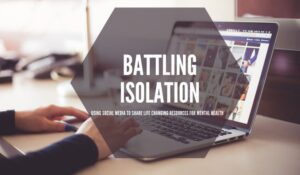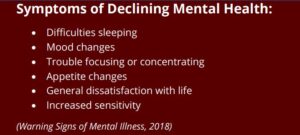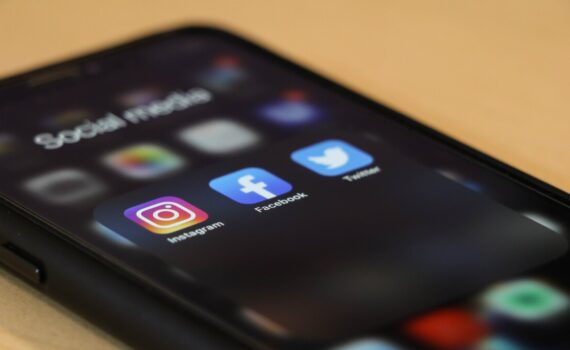Battling Isolation: Using Social Media to Share Life-Changing Resources For Mental Health
Category : PROspective
Written by: Maclane Abbott
It is no surprise that college students are one of the most mentally vulnerable populations. Many students are already struggling with mental illness, and a large amount rely on social support for coping. With the decrease in social events,
recommendations and regulations keeping students at home, and continued navigation of virtual learning college students are at a disadvantage during a critical period in their life. Fortunately, social media has allowed the sharing of (otherwise unknown) helpful tips and resources that students can use to increase their mental health and prevent any relapse or decreased well-being while staying safe at home.

The Impact of COVID-19 on Mental Health
I think we can all safely agree that the coronavirus pandemic has significantly increased everyone’s anxieties and struggle with daily life while creating a terrifying uncertainty surrounding our futures. For college students specifically, we lost inperson classes, sporting events, graduation ceremonies, and in some cases, previously agreed upon internships and job opportunities. These jarring and unexpected events happened within the course of a few short weeks, and that doesn’t even include the losses of family members and financial struggles that were bound to start occurring over the next year.
According to a study conducted by the Texas A&M University Department of Industrial and Systems Engineering, 71% of students reported increased stress and anxiety due to the outbreak (Son et al., 2020). Of these students, only 5% sought out mental health services, leaving the majority to decipher and understand their
situations without professional help. Unfortunately, this leads us to believe that most students in need are either unwilling or unable to receive help. The coronavirus pandemic forced most, if not all, on-campus resources for student
mental health to close their in-person operations and find ways to provide services virtually. This process wasn’t instantaneous and prevented students from access to the resources that were previously so easily accessible.

Thankfully, college students adapted and quickly began using social media to share their experiences with online resources, tips, and general advice on how to better maintain mental health through these troubling times. Despite some claims that social media is the downfall of society, this turned out to be invaluable for
students (and everyone else!) who were searching for help that their schools could no longer provide.
#LetsTalk #TogetherWeCan
The popular social media platform, Twitter, was one of the first to acknowledge to increasing need for mental health awareness during the early stage of the pandemic. In May 2020, the company partnered with over 60 mental health
and psychological organizations to spread information, resources, and helpful tips through various hashtags including #LetsTalk, #TogetherWeCan, #MentalHealthAwareness and other creative variations of the tags. The goal was to
create an honest and open conversation about mental health experiences and how to overcome them around the world. By the end of May, the hashtags had reached over half a million posts. Even today, you can search through these tags and findeven more discussions on available resources and personal stories of mental health amidst a global pandemic.
This Twitter movement kicked off the beginning of a necessary conversation. Many social media influencers and celebrities took to the platform to share their stories or simply try to normalize the act of seeking help. Several of these posts contained links to free or low cost online mental health services such as BetterHelp.com, Sharpen, Ten Percent Happier, and more, as well as sharing personal tips and tricks that were found to be successful.
Try this…
Establish a healthy routine
- A day of nothing may sound tempting, but it can harm your mental health. Try to find a routine that is structured as close to your pre-covid routine as possible. Don’t worry too much about following a strict schedule, rather create a general to-do list consisting of your necessary work and including break times and tasks that make you happy!
Stay active
- Even short amounts of physical inactivity will start impacting your mind and body, so try to find ways to move around. If athome workout routines aren’t your style, try putting on your favorite songs and having a solo dance party!
Fight the boredom
- Ignore the urge to sleep all day and try to find new hobbies and activities that stimulate your brain and create a sense of purpose. Accomplishing tasks is a fantastic way to start improving your mood.
Don’t let communication die
- As difficult as it may be, staying connected with friends and family is critical to minimize the impending anxieties that come with isolation. Using phone calls, social media, or texting is a convenient way to check in on your loved one’s well being while simultaneously improving your own. If you are taking advantage of the isolation to avoid dealing with said family (no judgement because, let’s admit it, we’ve all got someone we are glad not to deal with as frequently) try joining support groups or discussion boards for whatever interests you and make new friends!
Don’t be afraid to get professional help
- Perhaps the most important never be afraid to seek out help from a professional. Mental illnesses are common and frequently need professional intervention to remedy. It is nothing to be ashamed about, and most people will experience this at some point in their life! Explore your options and find what works best for you. Carly McCord, director of Telebehavioral Care at Texas A&M Health and Clinical assistant professor at the Texas A&M College of Medicine and Texas A&M College of Education and Human Development discussed the importance of seeking help in an article for Texas A&M Today, by stating “Too often, self-care can be perceived as selfish, especially in the workplace. However, in this case, self-care is actually self-preserving and selfless. If you are promoting your own health, then you are also helping other people.”
Mental Health Resources:
• Crisis Text Line
Text “HELLO” to 741741
• SAMHSA Disaster Distress Helpline (24/7)
1-800-846-8517
Text “TalkWithUs” to 66746
• National Suicide Prevention Lifeline
1-800-273-8255

Maclane graduated from Texas A&M in 2021 with a degree in Public Health and is now a first-year epi student with an interest in infectious diseases and reproductive epidemiology. She is serving on RSGA as one of the Epidemiology Department student representatives.
